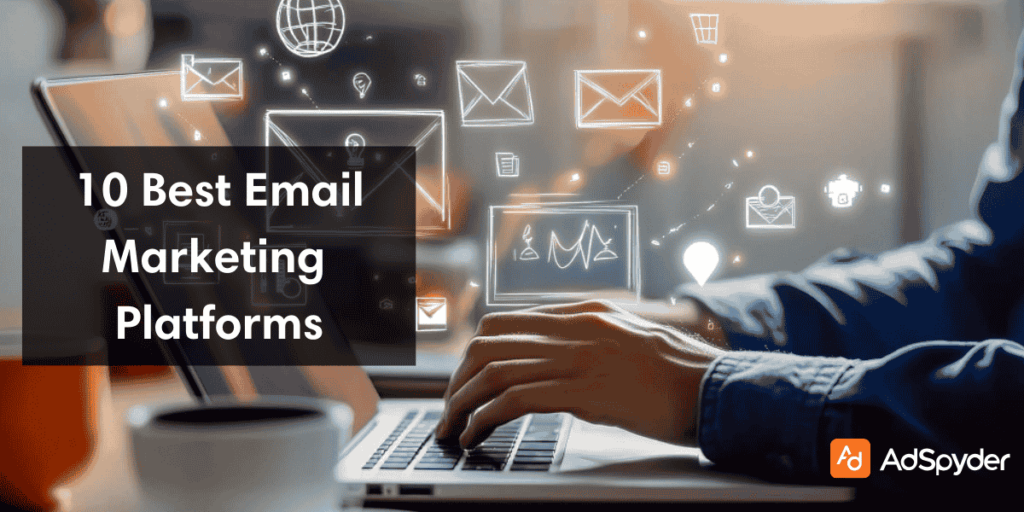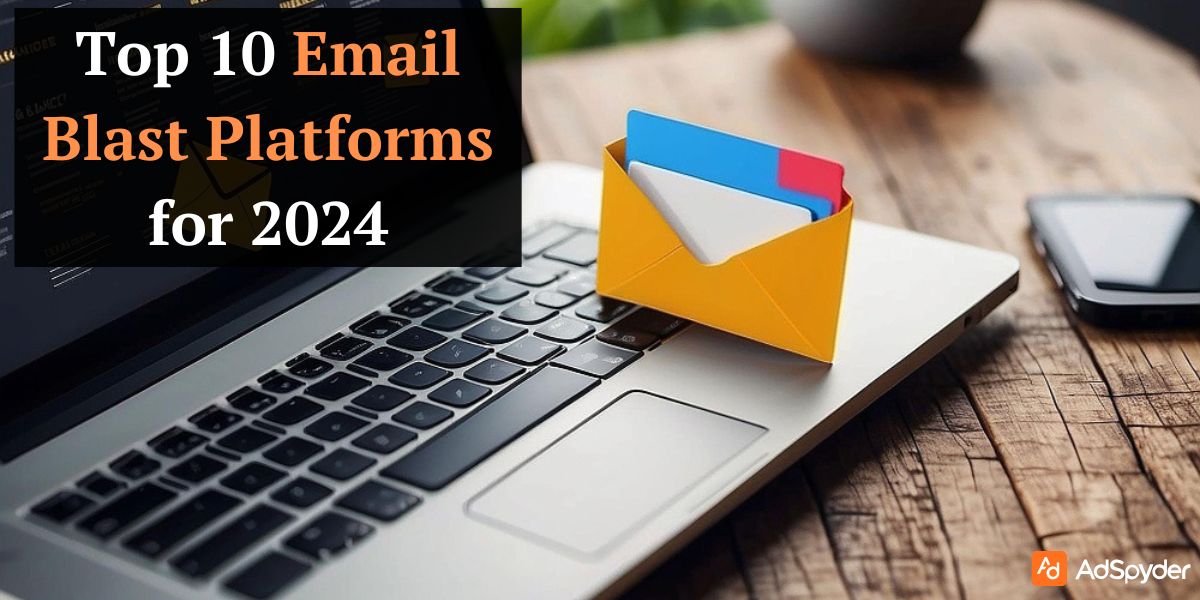Email marketing remains one of the most effective channels for engaging customers, driving conversions, and cultivating relationships. Find an appropriate platform that aligns with your business goals and marketing strategy is key for ensuring its success. There are various platforms out there; choosing one which meets these criteria should be your goal. In this blog we explore 10 email marketing platforms; exploring their features, strengths, and ideal use cases so you can select the one best suited to meet your needs.
Ready to Elevate your Marketing Strategy?
Top Features to Look for in an Email Marketing Platform
Here are some pointers on features to look for in an email marketing platform:
Automation Capabilities
- Why It’s Important: Automation saves time by scheduling emails, sending triggered responses, and managing drip campaigns. Look for platforms that offer robust automation features, such as welcome sequences, abandoned cart reminders, and personalized follow-ups.
- Key Feature: Advanced automation workflows that allow for multi-step campaigns based on user behavior.
Segmentation and Personalization
- Why It’s Important: Segmentation enables targeted messaging to different audience groups, leading to higher engagement. Personalization goes beyond addressing recipients by name, allowing content to be tailored based on past purchases, browsing history, or preferences.
- Key Feature: Dynamic content insertion that customizes email elements based on subscriber data.
Analytics and Reporting
- Why It’s Important: Data-driven insights help optimize campaigns. Essential metrics include open rates, click-through rates, bounce rates, and conversion tracking. These metrics allow you to gauge how your endeavours are working out (or not). Also you can pinpoint the reasons for the performance and take timely steps.
- Key Feature: Comprehensive dashboards with real-time reporting and A/B testing capabilities for performance improvement.
Integrations
- Why It’s Important: Seamless integration with other tools (CRM, e-commerce platforms, social media) enhances campaign efficiency and data synchronization. This is crucial for businesses that rely on multiple tools for marketing. These tools allow for managing email marketing strategies among your teammates. This can be invaluable for your business.
- Key Feature: Native integrations with popular platforms like Shopify, Salesforce, and WordPress.
Template and Design Tools
- Why It’s Important: An easy-to-use editor with pre-designed templates helps create professional-looking emails quickly. Look for drag-and-drop functionality and mobile-responsive templates. These templates allow for quick implementation of ideas and make your marketing wheel moving.
- Key Feature: A/B testing for different templates and design elements to optimize email layout.
Deliverability Optimization
- Why It’s Important: Ensuring emails reach the inbox is crucial. Platforms with features like spam testing, sender score monitoring, and deliverability reports can improve inbox placement.
- Key Feature: Dedicated IP addresses and deliverability tools for large-scale senders.
Compliance and Security Features
- Why It’s Important: With regulations like GDPR, CCPA, and CAN-SPAM, compliance is critical. Email platforms should offer tools to manage consent, data encryption, and privacy settings.
- Key Feature: Built-in features for easy compliance management, such as consent tracking and unsubscribe handling.
Choosing an email marketing platform with these top features ensures more efficient campaigns and better engagement. It ultimately cntributes to improved ROI. Understanding these features helps businesses select a platform that aligns with their marketing goals and user needs.
1. Mailchimp

Description:
Mailchimp is an industry powerhouse when it comes to email marketing, known for its user-friendly interface and comprehensive feature set. Suited for businesses of all sizes – from startups to enterprises – and providing powerful tools that streamline email marketing efforts, Mailchimp stands out from its competition as a user-friendly email solution that delivers results.
Key Features:
- Email Templates: Mailchimp provides an impressive library of customizable templates designed to meet the needs of various industries and campaign types. Each template is both visually appealing and mobile responsive to ensure your emails look great across devices.
- Automation: Mailchimp boasts an expansive library of customizable templates tailored specifically for various industries and campaign types. Each template is designed to look beautiful across devices ensuring your emails look great no matter who is reading them.
- Analytics: Mailchimp provides robust analytics and reporting features, enabling you to monitor key metrics such as open rates, click-through rates, conversion rates and revenue generated from email campaigns. This information allows you to optimize strategy development and increase campaign performance.
- Audience Segmentation: Audience segmentation tools on our platform allow you to easily divide your email list into smaller targeted groups based on behaviour, demographics and engagement levels. This segmentation helps create targeted email campaigns for more engaging content to specific segments of your audience.
Best For:
Mailchimp provides small—to medium-sized businesses, startups, and organizations with an intuitive email marketing platform with advanced automation features and analytics features for managing email campaigns easily and cost-effectively.
Pros:
- An extensive library of email templates.
- An intuitive drag-and-drop editor
- A basic plan with free features.
Cons:
- Pricing may increase dramatically as your email list grows.
- Limited advanced features are included on free plans.
2. Constant Contact

Description:
Constant Contact has long been considered one of the premier email marketing platforms, known for its intuitive design and outstanding customer support. Its popularity among small businesses and organizations that value efficiency is undeniable.
Key Features:
- Easy-to-Use Editor: This platform boasts an intuitive drag-and-drop editor for quickly crafting visually engaging emails without needing technical know-how – so even beginners can produce professional emails quickly!
- Social Media Integration: Constant Contact makes it possible to link email campaigns directly with social media platforms, expanding their reach and driving more visitors directly to your website.
- Event Management: Event management features within this platform include invitation creation and RSVP tracking as well as reminder services; making these tools particularly valuable to organizations hosting events requiring efficient communications management.
- Detailed Reporting: Constant Contact offers robust analytics to measure the success of email campaigns. Track metrics such as open rates, click-through rates and engagement levels to gain insight into how well your audience interacts with your emails.
Best For:
Constant Contact is best suited to small businesses and organizations that prioritize ease of use and require exceptional customer support, in addition to those needing event management features built directly into their email marketing efforts.
Pros:
- Outstanding customer support services.
- User-friendly interface and drag-and-drop editor.
- Integrates smoothly into social media platforms.
Cons:
- It provides less advanced automation features compared to its rivals.
- Pricing may increase for larger email lists.
Check Out: Top 10 Inspiring Dhanteras Ads of 2024
3. Sendinblue

Description:
Sendinblue is an innovative email marketing platform, that goes far beyond email to offer businesses all-in-one communication tools such as email, SMS and chat functionalities. Specifically tailored for small to midsize enterprises.
Key Features:
- Email Marketing: Sendinblue offers an email marketing solution with features for creating and sending promotional emails quickly and effortlessly, including templates and an intuitive drag-and-drop editor to design them with ease.
- SMS Marketing: Sendinblue offers SMS marketing capabilities as an additional means to engage and connect with audiences through text messages – providing another channel of engagement and communication for you and your message.
- Chat: Our platform features a chat function to facilitate real-time dialogue with website visitors and engage them as they browse your site. This enables immediate support as they explore it further and increase potential customer acquisition rates.
- CRM Integration: Sendinblue integrates seamlessly with CRM tools for more effective customer relationship management, helping you effectively organize customer data while tailoring emails based on CRM insights.
Best For:
Sendinblue offers businesses looking for a comprehensive marketing solution with email, SMS and chat functionalities an all-encompassing marketing solution that includes email marketing. This platform is especially useful for unifying communication efforts across departments into one easy platform.
Pros:
- A comprehensive suite of communication tools.
- Affordable pricing with a free plan option.
- Advanced automation capabilities.
Cons:
- Limited advanced analytics features when compared with some competitors.
- Additional costs for SMS marketing.
4. HubSpot

Description:
HubSpot is an inbound marketing platform known for offering powerful email marketing features as part of a suite of tools, as well as seamless CRM integration and advanced automation features.
Key Features:
- CRM Integration: HubSpot’s email marketing features are seamlessly integrated with its CRM, making it possible to track customer interactions and personalize email campaigns based on CRM information. This integration improves relevance and effectiveness.
- Automation Workflows: HubSpot provides advanced automation workflows that make creating email sequences based on user behaviour and interactions incredibly straightforward, helping nurture leads, manage customer journeys and foster engagement with ease. These sophisticated automated sequences also facilitate the nurturing of leads.
- Personalized Content: Our platform’s personalization tools enable you to deliver email content based on recipients’ behavior, preferences, or CRM data, increasing relevancy for greater results and driving better engagement rates with email campaigns.
- Analytics: HubSpot provides in-depth reports and analytics to monitor the success of email campaigns. Key metrics you can track include open rates, click-through rates, ROI calculations and ROI to gain vital insights for improving email marketing strategy.
Best For:
HubSpot is ideal for businesses that seek an integrated marketing platform with strong CRM and automation features, particularly those focused on inbound marketing or customer relationship management. Its particular value can be seen among inbound marketing services or those looking for customer engagement management platforms.
Pros:
- Comprehensive suite featuring CRM integration.
- Automated features for personalization.
- Utilisation of data analytics and reporting features.
Cons:
- High cost when compared with other email marketing platforms
- some features may be complex for beginners.
Must see: Top 12 Social Media Monitoring Tools for 2024
5. GetResponse

Description:
GetResponse is the best email marketing platforms that offers a range of features designed to help businesses engage their audience and drive conversions. It stands out with its additional marketing tools, including landing pages and webinars.
Key Features:
- Autoresponders: GetResponse’s powerful autoresponder features allow you to build automated email sequences for various uses – like onboarding new subscribers, nurturing leads or engaging dormant contacts.
- Landing Pages: The platform includes tools for building high-converting landing pages for lead generation, promotions and special offers that integrate smoothly with email campaigns. These pages integrate easily.
- Webinar Hosting: GetResponse’s webinar hosting features provide a simple yet effective way to conduct live webinars and online events directly through its platform, providing real-time engagement between you and your Target audience and generating leads with targeted messaging and lead gen opportunities.
- Marketing Automation: GetResponse’s marketing automation tools allow you to easily build sophisticated workflows that respond to user actions and behaviours to deliver personalised content and boost customer engagement.
Best For:
GetResponse is ideal for businesses that need an all-encompassing marketing platform featuring landing pages and webinars, making the integration of various activities into one platform possible. It can provide businesses with everything from lead management tools such as landing pages to CRM.
Pros:
- Utilizing multiple features ranging from landing pages and webinars
- Robust automation capabilities.
- Flexible pricing plans.
Cons:
- New users often find the user interface confusing or intimidating.
- Template selection may be more limited compared to other platforms.
6. AWeber

Description:
AWeber is a well-established best email marketing platforms known for its ease and effectiveness. This makes it especially appealing among small businesses and entrepreneurs seeking hassle-free email solutions.
Key Features:
- Drag-and-Drop Email Editor: AWeber’s intuitive drag-and-drop editor makes creating visually engaging emails easy without needing design expertise. It enables you to craft professional emails quickly and efficiently.
- Email Automation: AWeber provides robust email automation tools, allowing users to set autoresponders and automated sequences based on user behaviour and engagement, to nurture leads while maintaining effective communications with contacts. This feature is essential in nurturing leads while remaining consistent in communication between team members.
- Templates and Sign-Up Forms: The platform provides customizable email templates and sign-up forms that help you capture leads and grow your subscriber base. Each template is mobile-responsive and engaging.
- Analytics and Reporting: AWeber includes analytics and reporting features for you to monitor the success of your email campaigns, such as open rates, click-through rates and conversion rates – so that you can evaluate their efficacy more objectively.
Best For:
AWeber is ideal for small businesses and entrepreneurs seeking an easy yet robust email marketing platform with essential features for building and automating email campaigns.
Pros:
- Easy drag-and-drop editor.
- Reliable automation features.
- Cost-efficient pricing options are available to small businesses.
Cons:
- Limited advanced features compared to some competitors.
- Reduce integrations with third-party tools.
7. Active Campaign

Description:
ActiveCampaign is an exceptional email marketing and CRM platform, known for its advanced automation features and robust customer relationship management tools. Specifically tailored for businesses that require comprehensive tools for both email marketing automation as well as sales force automation, ActiveCampaign provides businesses with everything needed for email and sales automation in one solution.
Key Features:
- Advanced Automation: ActiveCampaign’s automation workflows can be tailored precisely to the way that suits you best, giving you total freedom over how they function based on user behaviour, interactions or CRM data. These sequences enable you to deliver tailored messages while increasing engagement levels with prospects.
- CRM Integration: CRM features on our platform allow you to effectively manage customer relationships, track interactions and automate sales processes – streamlining marketing and sales efforts and streamlining efforts across both departments.
- Segmentation and Personalization: ActiveCampaign provides powerful segmentation and personalization tools, which enable you to reach specific segments of your audience with tailored email content, increasing the relevance and effectiveness of email campaigns.
- In-Depth Analytics: The platform offers comprehensive analytics and reporting to allow you to measure the success of your email campaigns, such as open rates, click-through rates and ROI to optimize your email marketing strategy.
Must See: Top 10 AI-Enabled Email Marketing Tools
Best For:
ActiveCampaign provides businesses seeking an all-encompassing marketing automation, CRM integration, and analytics solution with advanced automation features and powerful email marketing and sales automation features. ActiveCampaign’s email marketing tools also come in handy here for increasing email campaigns or automating sales strategies.
Pros:
- Advanced automation and CRM features.
- Highly configurable workflows.
- Deep analytics and reporting.
Cons:
- Beginners face a steeper learning curve.
- Higher costs compared with basic email marketing platforms.
8. Campaign Monitor

Description:
Campaign Monitor is an email marketing platform focused on offering visually appealing email design tools and powerful analytics, making it suitable for businesses that prioritize aesthetics alongside data-driven decision-making.
Key Features:
- Email Design: Campaign Monitor offers an array of design tools and templates to create visually captivating emails, such as its drag-and-drop editor and customizable templates that ensure they appear professional yet engaging for readers.
- Automation Features: Automation tools available within this platform enable you to set up email sequences such as welcome emails, product recommendations and re-engagement campaigns with ease – helping maintain consistent communications with your audience.
- Analytics and Insights: Campaign Monitor offers powerful analytic and reporting tools to monitor the success of email campaigns, such as open rates, click-through rates and conversion rates to gain invaluable insight into email performance.
- Personalization: Our platform makes it possible for you to personalize email content based on subscriber data, increasing both the relevance and impact of messages sent out. By developing dynamic material tailored specifically for various segments of your target audience, dynamic campaigns become even more effective at engaging target customers.
Best For:
Campaign Monitor is ideal for businesses that prioritize email design and aesthetics while seeking robust analytics and personalization features. In particular, its visual email creation capabilities make it suitable for companies wanting to develop visually pleasing emails while tracking performance accurately.
Pros:
- Fantastic email design tools and templates!
- Comprehensive automation features.
- Comprehensive analytics and reporting.
Cons:
- Small businesses may find the costs involved prohibitive.
- Limited CRM and sales automation features are available.
9. Moonsend

Description:
Moonsend is the best email marketing platforms known for providing businesses with all of the features necessary to develop effective email campaigns and automate marketing processes, all at an economical and user-friendly cost. Moonsend prides itself on offering reliable yet user-friendly technology solutions at an excellent value point.
Key Features:
- Email Campaigns: Moonsend provides tools for designing and sending email campaigns, such as customizable templates and an editor with drag-and-drop capability. Their email builder makes creating visually pleasing emails simple.
- Automation: Automation features are built into our platform and offer automation features for setting up email sequences such as welcome emails, cart abandonment reminders and lead nurturing campaigns – helping your audience connect more efficiently. These automated tools assist your engagement strategies more efficiently.
- Segmentation: Moonsend provides audience segmentation tools, allowing you to specifically target specific groups with tailored emails. By doing so, segmentation increases the relevance of emails while improving engagement rates and conversion rates.
- Analytics: Moonsend provides analytics and reporting features to monitor the performance of email campaigns. Key metrics, including open rates, click-through rates, conversion rates and effectiveness measures can all be monitored through Moonsend for assessment of campaign effectiveness.
Best For:
Moonsend is the best email marketing platforms that provides businesses with an affordable and user-friendly email marketing solution with essential features for creating and automating email campaigns.
Pros:
- Cost-cutting pricing plans are available.
- User-friendly interface featuring drag-and-drop editor.
- Robust automation features.
Cons:
- Limited advanced features when compared with higher-end platforms.
- Lesser integrations with third-party tools.
See It Here: Top Ad Creative Tools
10. MailerLite

Description:
MailerLite is the best email marketing platforms renowned for its ease of use and accessibility, catering specifically to businesses that need an approach without complex features or bells and whistles.
Key Features:
- Email Editor: MailerLite features an easy drag-and-drop email editor that makes creating professional emails simple. Their editor is accessible even to users without extensive design knowledge.
- Automation: This platform includes automation tools that make creating email sequences and workflows simple and effective, helping you stay consistent in communicating with subscribers and ensuring ongoing interactions between subscribers and brands.
- Landing Pages: MailerLite gives you all of the tools necessary to build landing pages to capture leads and promote offers, seamlessly integrated with email campaigns to drive conversions and greater returns for conversion.
- Analytics: MailerLite provides basic analytics and reporting features to allow you to track the success of your email campaigns, such as open rates, click-through rates and subscriber growth metrics.
Best For:
MailerLite was developed for small businesses and startups looking for an easily customizable best email marketing platforms equipped with essential features for email creation and automation. Check out the pros & cons to check if this fits your requirements:
Pros:
- Easy and user-friendly interface.
- Affordable pricing plans.
- Includes landing page builder.
Cons:
- Limited features and integrations are available.
- Basic analytics compare favorably to more comprehensive platforms.
See It Here: Top Diwali Ads 2024
Comparison Table
| Platform | Key Features | Best For | Pros |
| Mailchimp | Email templates, automation, analytics, and audience segmentation. | Small to mid-sized enterprises. | Extensive templates, an intuitive editor and and free plans available are hallmarks of success in today’s business climate. |
| Constant Contact | Easy-to-use editor with social media integration, event management capabilities, and detailed reporting features. | Small businesses and organizations. | Excellent support and a user-friendly interface are hallmarks of excellence for any successful company. |
| Sendinblue | Email, SMS, and chat messaging, CRM integrations as well as automation workflows can all play their parts to improve workflow management and automation processes. | Businesses seeking multi-channel marketing solutions. | Comprehensive tools are at affordable prices. |
| HubSpot | Integration, advanced automation, personalized content production and comprehensive analytics | Integral Marketing and CRM needs. | Strong CRM and automation technology with comprehensive reporting is indispensable to business. |
| GetResponse | Autoresponders, landing pages, webinar hosting services and marketing automation technologies. | Multifaceted marketing needs. | Versatile features and robust automation are hallmarks of success for any enterprise. |
| AWeber | Drag-and-drop editor, email automation, templates and analytics | Small businesses and entrepreneurs. | Small businesses need solutions that are straightforward, reliable and budget-friendly. |
| ActiveCampaign | Advanced automation, CRM integration, segmentation, and in-depth analytics. | Advanced automation, CRM integration, segmentation and in-depth analytics. | Advanced features, CRM integration and customizable workflows make for a powerful combination. |
| Campaign Monitor | Email design tools, automation, detailed analytics, personalization. | Businesses focusing on design and data-driven insights. | Outstanding design tools with comprehensive reporting. |
| Moonsend | Email campaigns, automation, segmentation and analytics. | Email marketing that is both cost-effective and user-friendly is increasingly effective in today’s globalized environment. | Cost-efficient, user-friendly interface and effective automation – that all make for the ideal package of software solutions. |
| MailerLite | Drag-and-drop editor, automation tools, landing pages and basic analytics | Small businesses and startups. | Simple-to-use, cost-effective landing pages included |
Integrating Email Marketing with Other Channels
Integrating your email marketing platforms with other channels allow for a comprehensive omni-channel marketing approach. Here are a few things you can use to interlink these platforms for your benefit:
| Channel | Integration Strategy | Benefits |
| Social Media | Use email sign-up forms integrated with social platforms (e.g., Facebook Lead Ads). Share email-exclusive content on social channels to encourage subscriptions. | Expands email list growth and creates a seamless user experience across platforms. |
| SMS Marketing | Combine SMS and email for coordinated campaigns (e.g., send an email first, then follow up with a text). Include SMS opt-in links within emails. | Increases campaign reach and engagement by reaching customers on multiple devices. |
| CRM Systems | Sync email data with CRM tools to create detailed customer profiles. Use CRM data to trigger personalized email campaigns based on user behavior. | Enhances personalization and ensures consistent messaging throughout the customer journey. |
Conclusion
Selecting an email marketing platform that meets your business requirements and goals is vitally important to their success. Each of the available platforms provides various features and benefits designed to address particular business requirements or goals; whether advanced automation, comprehensive CRM integration or simple, cost-efficient solutions are your priority, there will surely be something that meets them all!
Mailchimp and Constant Contact offer comprehensive solutions for businesses requiring extensive email design tools and customer support, while Sendinblue’s multi-channel approach and HubSpot’s inbound marketing features make for an efficient inbound strategy. GetResponse stands out as having additional tools like landing pages and webinars; AWeber/ActiveCampaign offer powerful automation features; Campaign Monitor excels in design/analytics features while Moonsend affordably combines essential functions while MailerLite keeps things easy with user-friendly user-interface features – unlike some competitors such as Moonsend or HubSpot!
By carefully considering your specific needs and comparing the features and prices of each platform, you can make an informed choice and select an effective email marketing tool to support your marketing strategy and achieve greater results.
FAQs
Mailchimp offers an intuitive interface, automation, and comprehensive analytics, making it ideal for businesses of all sizes.
Its ease of use and excellent customer support make it great for small businesses, with features like event management and social media integration.
It offers multi-channel communication tools, including email, SMS, and chat, ideal for small to mid-sized businesses.
HubSpot combines email marketing with powerful CRM and automation tools, making it suitable for businesses focused on inbound marketing.
GetResponse integrates landing pages and webinars, providing an all-in-one solution for lead generation and engagement.
AWeber is easy to use, offering email automation, templates, and affordable pricing for entrepreneurs and small businesses.
ActiveCampaign provides advanced automation and CRM integration, making it a top choice for businesses needing complex workflows.




